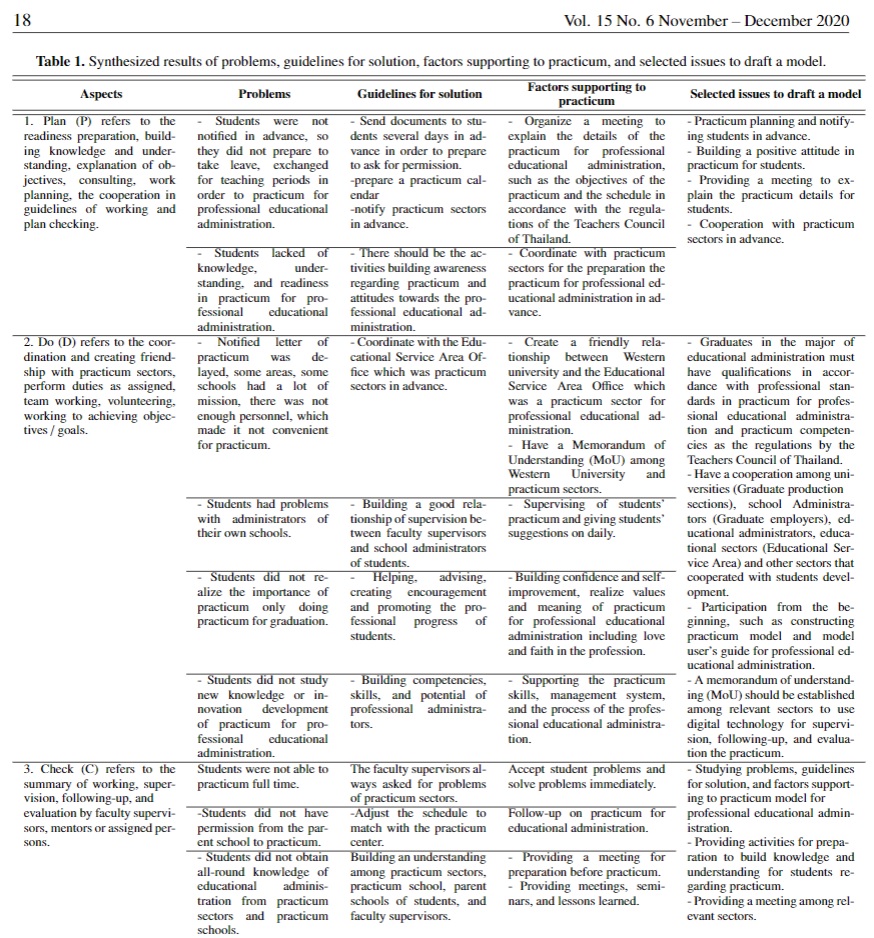Practicum model development for professional educational administration in digital era
Main Article Content
Abstract
The objectives of this research were 1) to analyze professional standards, practicum, and competencies for educational administration, 2) to investigate problems, guidelines for solution, and factors supporting to practicum, 3) to draft, verify, and evaluate a practicum model and model user’s guide, and 4) to implement and study the practicum model and model user’s guide. Key informants were selected by purposive sampling. Instruments used were a structured interview form, an open-ended question, and a 5 rating-scale questionnaire. Data were analyzed by percentage, mean, standard deviation, content analysis, and summarizing. Results were as follows: 1. The professional standards, practicum, and competencies had suitability and feasibility into practice; 2. The most important problem was the practicum preparation, a guideline for solution was to prepare a practicum calendar, and a factor supporting to practicum was there should be a Memorandum of Understanding (MoU); 3. A draft model of practicum consisted of 5 elements, the verification results in accuracy was at 98.07 percent, and suitability was at 98.06 percent; and the evaluation results in possibility was at a high level and utility was at the highest level; 4. The students' satisfaction were at highest level. The faculty supervisors recommended that the students should have more time for practicum. The complete model of practicum for professional educational administration in digital era was 'ROOGC (western) +M' model.
Article Details

This work is licensed under a Creative Commons Attribution-NonCommercial-NoDerivatives 4.0 International License.
References
Office of the National Education Commission, Office of the Prime Minister, National Education Act B.E. 2542 (1999) and Amendments (Second National Education Act B.E. 2545). http://www.moe.go.th/main2/plan/p-r-b42-01.htm, (accessed 9 February 2019).
Royal Thai Government Gazette, Teachers and Educational Personnel Council Act B.E. 2546. https://person.mwit.ac.th/01-Statutes/TeacherPersonnelAct.pdf, (accessed 9 February 2019)
Professional Standard Bureau, Secretariat Office of the Teachers Council of Thailand, The conduct of certifying the degrees of educational certificates for professional practice license B.E. 2557.
J. Suphat, 20-Year Long Range Plan on Higher Education of Thailand, B.E. 2561 2580 (2018-2037). http://www.
mua.go.th/users/bpp/main/download/plan/plan20yrs.pdf, (accessed 9 February 2019)
R. Teera. Professional in educational management and administration in educational reform era. Bangkok: Khaofang Publishing, 2007.
Royal Thai Government Gazette, Regulation of the Teachers Council of Thailand on Professional Code of Conduct B.E. 2556. http://site.ksp.or.th/download.php, (accessed 9 February 2019)
National Center on Education and the Economy. South Korea: Teacher and Principal Quality. https://ncee.org/whatwe-do/center-on-international-education-benchmarking/topperforming-
countries/south-korea-overview/south-koreateacher-and-principal-quality, (accessed 9 February 2019)
P. Beatriz, N. Deborah, M. Hunter, Improving school leadership. http://www.oecd.org/education/school/44374889.pdf (accessed 9 February 2019)
P. Phubet, P. Choocheep, A model of work-integrated learning to prepare educational administrators for Thailand, Interdisciplinary Research Review 15(3) (2020) 7 – 13.


